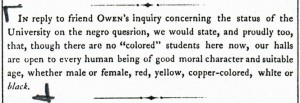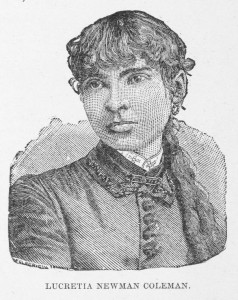With all of the recent events on campus commemorating the anniversary of the Emancipation Proclamation, several have asked when the first African-American students attended Lawrence. The answer is, most likely, in 1872, when a woman named Lucretia Newman entered the freshman class.

But according to J. A. Owen, class of 1860, African-American students had tried attending Lawrence even earlier. Owen wrote a letter to the Lawrence Collegian in 1869 recalling an incident that occurred in 1858, when “a black man applied for admission to the University as a preparatory student.” Owen reported that the student was admitted and attended for a few days before “some anti-negro men in Appleton, outside of the University, got excited about it, and became alarmed lest their daughters and sisters should become contaminated, and called a public meeting to see what should be done to avoid the danger.” Though several Lawrence students at the meeting spoke in favor of justice for the student, many townspeople were unsatisfied, and the student left Lawrence shortly thereafter. In answer to Owen’s question of “how the University stands now,” the Collegianeditors replied: “our halls are open to every human being of good moral character and suitable age.”

Lucretia Newman may have been the next African-American student to attend Lawrence, a few years later. She entered Lawrence as a freshman in September, 1872, enrolled in the Scientific Course. Our records show that Newman attended Lawrence for one to two years before moving on, although later accounts of her life state that she graduated with a degree. In 1883, she became assistant secretary and bookkeeper for the African Methodist Episcopal Church. She also published her first literary work, a poem, in 1883. Newman Coleman went on to write articles published in primarily African-American journals such as Our Women and Children and the A.M.E. Review. Little is known about her personal life, but contemporaries and later scholars praised her writings.
Overall, only a handful of African-American students attended Lawrence before the middle of the 20th century. By that time, the lack of African-American students at Lawrence and the question of what should be done about it had become much bigger issues on campus.
Update: Another African-American student on campus at about the same time as Newman was Mary Cleggett Vanderhoop, who graduated in 1876.